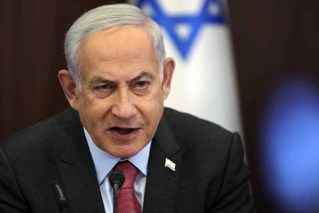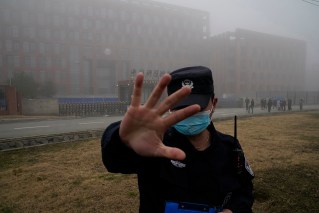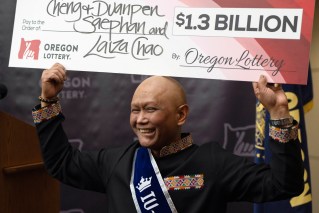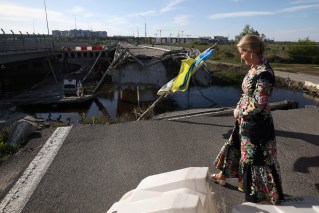Why withdrawing Australian support for Myanmar’s military isn’t so simple

Pressure is mounting on the Australian government to stop running military programs with Myanmar amid fresh local protests on Sunday, following the leadership grab.
But withdrawing military support is not a simple decision.
There are concerns that cutting off Myanmar may cause new problems, and clear the pathway for China to exert its influence.
On Sunday, thousands of protesters returned to cities in Myanmar to fight the military junta’s overthrow of their democratically elected leader Aung San Suu Kyi.

Myanmarese protesters demonstrate against the military coup outside the Myanmar embassy on Sunday. Photo: Getty
Demonstrators in the country’s largest city, Yangon, carried red balloons to represent Suu Kyi’s National League for Democracy Party (NLD).
“We don’t want military dictatorship! We want democracy!” they chanted.
About 100 people had also gathered in the coastal town of Mawlamine in the southeast, and students and doctors gathered in the city of Mandalay.
Military authorities have reportedly shut down nearly all of the country’s internet access to prevent people from organising gatherings and talking to foreign media.

Senior General Min Aung Hlaing has put himself in charge of Myanmar after Aung San Suu Kyi’s arrest. Photo: Reuters/Soe Zeya Tun
Foreign Affairs Minister Marise Payne confirmed an Australian had been detained at a police station and others were seeking consular assistance.
There are growing calls for the international community to step in and punish the military for disputing Myanmar’s November elections, which returned Suu Kyi’s NLD with an 80 per cent landslide.
UN Special Rapporteur Tom Andrews urged the United Nations Human Rights Council and countries around the world to crack down on Myanmar’s military.
“It is… critical that nations of the world take action to exert maximum pressure on the military dictators who have seized power, including through the imposition of targeted sanctions,” he said in a statement on Sunday.
Tweet from @RapporteurUn
But the situation is complicated for Australia.
For years, Australia has been running a program helping Myanmar’s military with the aim of instilling peace in the region.
Australian government documents describe it as a “modest program of engagement with Myanmar, focusing on humanitarian assistance and disaster relief, peacekeeping training, English language training, and officer education and professionalisation”.
Last week, Labor, The Greens and Human Rights Watch called on the Morrison government to cut ties with the military, but so far the Coalition has been reluctant to do so over fears it will send Myanmar into the arms of China.
China’s window of opportunity
China shares a border with Myanmar and has remained eerily silent about the unrest unfolding on its back doorstep.
In their public statements, Chinese authorities have deliberately avoided criticising Myanmar’s military, with state news agency Xinhua referring to the coup as a “major cabinet reshuffle”.
Derek Mitchell, a former US ambassador to Myanmar who is now president of the National Democratic Institute, told The New York Times that Chinese authorities “consider (Myanmar) their sphere of influence, no doubt about it”.
“They’re very wary of American influence in the country,” he said.
Mr Mitchell added the Chinese government saw the coup as “a moment of opportunity” to undercut the inroads the US and other Asian nations made during Myanmar’s steps toward becoming a functioning democracy.
If Myanmar descends into authoritarianism, it will play right into the hands of China.
That’s because the Tatmadaw, as the Myanmar military led by Min Aung Hlaing is locally known, will return the country to its pre-2011 foreign policy strategy of embracing China as its key partner.
Using China as protection, the military will be able to withstand punishment from the West, which includes sanctions over its military rule and persecution of Rohingyas.
China, along with Russia, have so far blocked a UN Security Council statement condemning the military coup, with China warning that sanctions or international pressure would only make things worse in Myanmar.
It is also possible the Chinese government is pleased media attention is being directed elsewhere while World Health Organisation investigators continue probing the origins of the coronavirus in Wuhan.
Even though China stands to benefit strategically from Myanmar’s isolation from western democracies, this doesn’t mean President Xi Jinping is supportive of the coup.
Prior to the military takeover, Mr Xi had enjoyed a close working relationship with Suu Kyi, with the pair meeting as recently as January 18.

Chinese President Xi Jinping and Myanmar State Counsellor Aung San Suu Kyi shake hands before a bilateral meeting in Naypyidaw on January 18, 2020. Photo: Getty
China is one of Myanmar’s closest allies, and is the country’s number one trading partner.
The return of the military means Mr Xi will have to work hard to win their trust after years of building rapport with Suu Kyi.
-with AAP








